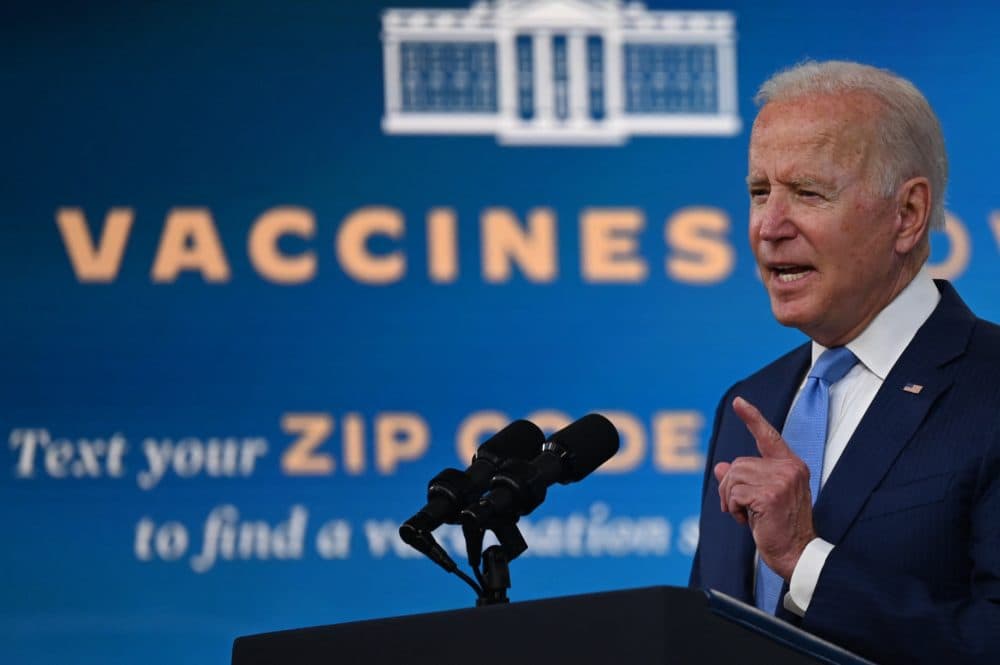Advertisement
Commentary
Vaccines Alone Won't Save Us. How Biden’s COVID-19 Action Plan Is Incomplete

Joe Biden’s recent COVID-19 address comes at an urgent time to address the delta surge and to prepare the country for any future variants. The president's plan includes marginal improvements that may help some, but largely leaves us and our economy at the whims of the virus.
The virus is taking more than 1,500 lives each day. New hospital admissions of children and adults under 50 remain higher than in any other prior wave of the pandemic, and deaths among working-age people are surging. Meanwhile, federal pandemic unemployment programs expired and millions of renters are at risk of eviction. It’s time for a policy reset and for the federal government to step up its approach to contain COVID-19.
President Biden’s plan to stop the spread of the highly transmissible delta variant continues to point to vaccines alone as the country’s path out of the pandemic. Vaccines are very effective for reducing hospitalizations and deaths, but less so for reducing COVID-19 transmission. The administration overlooks the full range of public health strategies available to reduce the burden of COVID-19. Non-pharmaceutical interventions such as face mask mandates, capacity limits, workplace safety standards, improved ventilation and contact tracing are evidence-based approaches to controlling COVID-19. Transparent communication from federal leaders and complete, timely data reporting can complement these policy efforts and may also help to restore the nation’s trust.
Non-pharmaceutical interventions such as face mask mandates, capacity limits, workplace safety standards, improved ventilation and contact tracing are evidence-based approaches to controlling COVID-19.
We are health policy researchers at Boston University School of Public Health. Since the start of the pandemic, we have tracked state-level policies in response to COVID-19 and its economic ramifications in the COVID-19 U.S. State Policy (CUSP) database. Researchers have used our data to demonstrate associations between policy interventions — such as face mask mandates and eviction moratoria -- and reduced COVID-19 growth. Our database has been cited in White House policy documents and can be used to inform policymakers amidst a rapidly changing policy context. As public health experts immersed in policy data collection and analysis, we have seen that there is no single policy that will end the pandemic, but that policies can work together in support of population health and the economy.
The Biden administration’s vaccine-only approach over the past six months has not been enough to contain the delta variant. All states have now surpassed substantial or high levels of COVID-19 transmission. Divisive messaging from federal leaders puts the blame on those who are unvaccinated — many of whom face structural barriers to vaccination or are children under 12 who are not yet eligible. This focus on individual behavior sidesteps the onus of policymakers to protect the health of all Americans and ignores the public health tools available to do so.
President Biden’s call for vaccine mandates may help to increase vaccination rates. However, preventing high rates of transmission of the delta variant will require high vaccine coverage to be layered with complementary interventions to prevent COVID-19. Anecdotal evidence of breakthrough cases at dinner parties of fully vaccinated people and outbreaks in communities like Provincetown with high vaccination rates suggest that the delta variant presents a risk even among groups of fully vaccinated individuals.
As a result, scaling up convenient and free access to rapid and PCR testing plays a role in COVID-19 mitigation even in settings that mandate vaccination. Biden's plan aims to expand access to testing and reduce the cost of rapid at-home tests, although the reduced cost still remains higher than in other countries. Continued federal investment in testing resources may also help facilitate complete data collection and reporting of breakthrough infections, so that we may better understand the risk of COVID-19 among those who are vaccinated.
Vaccine outreach and delivery to schools, workplaces, and neighborhoods can also help make progress toward the administration’s aim to increase vaccination rates nationwide. Many working-age people, including parents, report that they would like to be vaccinated but face structural barriers to accessing COVID-19 vaccines. For instance, low-income people, especially those with kids, are less likely to have access to paid sick leave to take time off from work to seek vaccination or recover from side effects. Expanding paid leave policies and administering vaccines at convenient times and locations for all workers and their families will likely improve vaccine uptake even without mandates.
The Biden administration’s vaccine-only approach over the past six months has not been enough to contain the delta variant.
In the midst of rising case numbers across the country and given that it takes four to six weeks for individuals to become fully vaccinated against COVID-19, additional public health interventions such as face mask mandates may have a more immediate protective effect than vaccine mandates. However, only seven states and the District of Columbia currently require face masks for the general public. As kids returned to school in person this fall, just 15 states and Washington D.C. implemented face mask mandates in schools. Biden has failed to unequivocally call for states to implement universal face mask mandates.
Although Biden’s plan is a step in the right direction, it falls short of protecting all Americans and the economy from the COVID-19 surge. Federal leadership, accountability, and a commitment to evidence-based public health strategies like universal indoor masking can lead our country out of the pandemic and minimize death and suffering.
About the authors: Julia Raifman is an assistant professor at Boston University School of Public Health. She leads the COVID-19 US State Policy (CUSP) database. Alexandra Skinner is a research fellow at Boston University School of Public Health and the database manager for the COVID-19 US State Policy (CUSP) database.